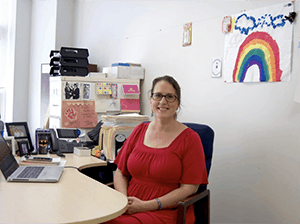By Emma Cotton/VTDigger
RUTLAND — The pandemic has exacerbated an existing shortage of foster homes in Rutland and throughout the state as an increased number of kids need a safe place to live.
In Rutland County, 153 kids and teens are in the foster care system, marking a 39% increase from the yearly average of 110. Meanwhile, the number of foster parents has dwindled, possibly because of the pandemic.
“There’s a need going up, just because the stressors and the needs in the community have increased for all sorts of reasons, Covid-related and not,” said Melinda Humphrey, a Rutland City resident and former alderman who has fostered a number of local kids.
“At the same time,” she said, “I think people that may have otherwise been interested in trying this out are backing away from it because of being in a pandemic.”
Rebecca Fitzsimmons, resource coordinator at the Dept. of Children and Families office in Rutland, said she’s looking for foster parents specifically to care for teens. Children under 6 years old formerly represented a larger percentage of kids in the system’s care, but that dynamic has switched.
“I think that’s where, statewide, we’ve sort of come up against this kind of crisis point where we have more youth than we have homes who are open to caring for youth,” Fitzsimmons said.

Rebecca Fitzsimmons in the Asa Bloomer Building in Rutland on Friday, June 18.
Most prospective foster parents, Fitzsimmons said, hope to foster infants or very young children. While there are still plenty of younger children who need care, more resources are available to them.
The pandemic brought new challenges to foster parents. With a remote schooling system, kids stayed at home more than usual. Some may have needed extra support with their classes. Parents may have worried about additional exposure to Covid-19, and isolation brought by the pandemic may have contributed to kids’ mental health and behavioral challenges.
“We’ve also seen the needs of those older kids and teens increasing,” Fitzsimmons said. “We’re seeing more substance use or mental health challenges, self harming behaviors — just unhealthy ways to cope with whatever abuse or neglect led them to being on our radar.”
Covid-19 may also be partially responsible for the greater number of children who cannot remain in the care of their parents. Lost jobs, isolation and illness added stress to families that were already having trouble accessing food and housing.
“When the parents are overwhelmed and they don’t have coping skills, unfortunately, that can lead to abuse and neglect that we may not have experienced with that family before,” Fitzsimmons said.
Courts have been backlogged during the pandemic, too, which has delayed children from returning home in some cases.
With the goal of creating more foster homes in the state — as opposed to sending them to out-of-state residential facilities — the state recently rolled out a program that offers higher pay and more training to foster parents who will eventually be equipped to house kids who have acute behavioral needs.
Fitzsimmons said about five families are currently enrolled in that program from around Vermont, and they’ll receive training on topics like de-escalation and crisis communication. She said the program will likely take place in phases as interest grows.
Chynah Boise, a clinician with Rutland’s branch of the Community Care Network, provides mental health support to foster parents — a one-of-a-kind program in the state, as far as she knows.
Foster parents, just like other parents, needed more support during the pandemic, she said. Some may have signed on to foster a teenager who, in non-pandemic times, would have been busy and away from the home for most of the day.
“Now, you’ve not only signed up to be a foster parent, but you are a teacher, a foster parent, a counselor — it was not what a lot of people signed up for,” she said.
She’s seen a few parents walk away, before and during the pandemic, but she tries to help them avoid those situations.
“I do try to say, ‘You are an invaluable resource, so what can we do to make this work for you?’” she said.
Humphrey, who began fostering in 2017, took in a 16-year-old boy just as the pandemic hit, which she called “challenging, but … also fun.”
“That was a little bit nerve-wracking, because the pandemic was still brand new, and it was kind of scary because he was also the first teenage boy that I had supported at home,” she said. “So it was a brand new experience during a really scary time.”
Humphrey said she’s made strong connections with the local kids she’s fostered since she first started. She works for Green Mountain Power in downtown Rutland and said the kids would sometimes stop in to see the employees’ dogs at the office after work.
She usually hosts one teen at a time, and there are often months between the kids who stay with her. Fostering, she said, isn’t always what people think it is.
Given the need for more homes, she encouraged prospective foster parents who are apprehensive, or have questions, to reach out to others who are already fostering.
“These are our community members,” she said. “Especially when we think about teenagers. It’s not just that they’re youth in our community right now, but they’re going to be adults in our community very, very soon. … It’s important for them to be a part of this community and know that they’re supported and that adults want them to be successful here.”
Those interested in fostering can contact their Family Services District office or visit dcf.vermont.gov/fsd/contact-us/districts.



